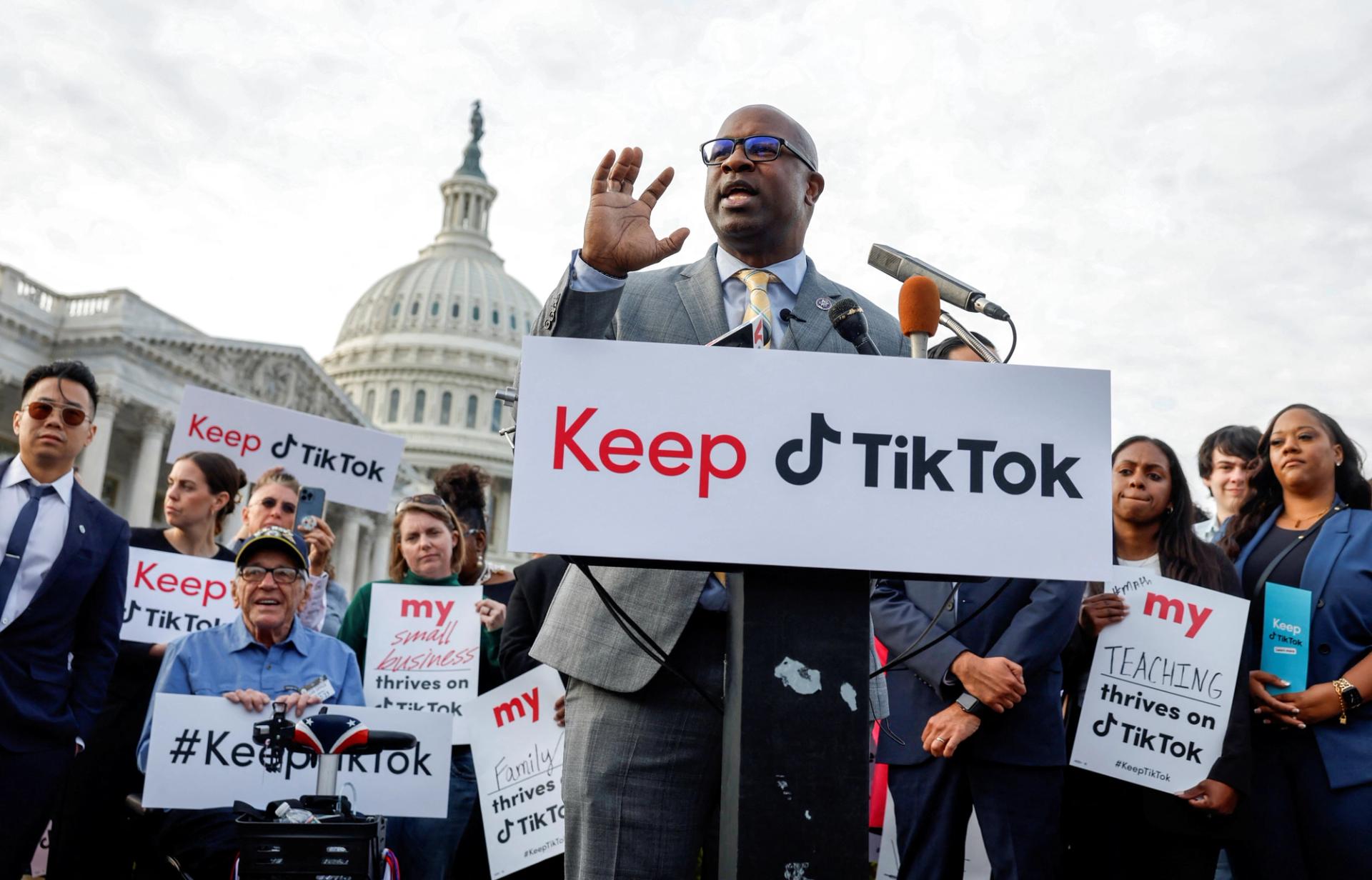The News
TikTok is looking a little less alone in Washington these days.
With talk of a ban on the social media giant growing louder among lawmakers, resistance to the idea has begun to emerge in Congress and on cable news thanks to an odd-bedfellows coalition of progressives, libertarians, and MAGA-approved Fox News pundits.
Some of the app’s newfound allies say they oppose a ban, full-stop, while others have taken specific issue with a bipartisan, White House-backed bill called the RESTRICT Act that would give Gina Raimondo and future Commerce secretaries broad powers to crack down on foreign technology products that raise national security concerns. Critics have argued it could lead to broad government overreach and punish normal internet users.
The View From The Left
Progressive “Squad” Reps. Jamaal Bowman, D-N.Y., Alexandria Ocasio-Cortez, D-N.Y., and Ilhan Omar, D-Minn have all come out against a proposed ban on TikTok. Bowman was the first high-profile elected official to do so, appearing alongside a cadre of influencers at a press conference on the eve of TikTok CEO Shou Zi Chew’s combative testimony before Congress late last month.
Bowman says the case made by TikTok’s critics — that its Chinese parent company could abuse American users’ data or spread propaganda on the platform — is mostly “hysteria” motivated by “xenophobic anti-China rhetoric.” Instead of banning TikTok, he argues lawmakers ought to regulate all social media companies, including American ones, in a more sweeping fashion.
“We can’t just allow American tech to be the Wild West while we have all these regulations when it comes to foreign tech,” Bowman told Semafor following last month’s hearing.
Ocasio-Cortez struck a similar note in her first TikTok post, saying lawmakers need to improve privacy laws to protect American users from “egregious data harvesting that companies can do without your significant ability to say no.” Omar, meanwhile, has said a TikTok ban would amount to “censorship” and undermine the First Amendment foundation that “sets us apart from authoritarian regimes like China.”
The View From Libertarians
Sen. Rand Paul, R-Ky., one of Washington’s more libertarian-minded lawmakers, became the lone Republican in Congress to push back against the prospect of a TikTok ban when he blocked a vote on a bill from Sen. Josh Hawley, R-Mo. last week. He also raised concerns about the impact on free speech, suggesting the U.S. would be emulating China by restricting access to TikTok.
In a reference to the RESTRICT Act specifically, Paul argued on the Senate floor that it “would basically be a limitless authority for the president to ban speech.”
The legislation, offered by Sens. Mark Warner, D-Va. and John Thune, R-S.D. and sponsored by roughly two-dozen others, would set up a process for the administration to restrict, and potentially ban, technology products that like TikTok are operated by a “foreign adversary” such as Russia or China.
Some critics of the RESTRICT Act have questioned whether it could result in the government criminalizing the use of virtual private networks, which are a common Internet security practice, to access TikTok.
“One of the difficulties with any of the proposed TikTok bans is there’s a question of how exactly do you enforce this,” said Jennifer Huddleston, a research fellow at the CATO Institute, who said broad language about criminal liability in the RESTRICT Act raises valid concerns for individual users.
Warner and his office say that’s simply not true.
“The threshold for criminal penalty in this bill is incredibly high — too high to be concerned with the actions of an individual user of TikTok or a VPN,” a Warner spokeswoman told Semafor.
The View From Fox News
The RESTRICT Act has also become a major target in conservative social media circles and on Fox News, where hosts Tucker Carlson and Jesse Watters have railed against it. They’ve zeroed in on the same broad language about criminal penalties that’s raised concern among think tanks like CATO, but amped up the rhetoric and tied it to more MAGA “deep state” fears.
In a recent segment, Carlson claimed the legislation would grant “enormous and terrifying new powers to the federal government” and usher in “totalitarianism.” Calling it the “PATRIOT Act for the internet,” Watters claimed it would enable spying on Americans, a description that caught one of the bill’s supporters Sen. Lindsey Graham, R-S.C. flat footed during a segment last week. Watters pointed to a provision of the bill that would allow authorities to investigate violations of actions taken against a foreign technology under the law.
“There is nothing in the bill allowing for surveillance on Americans and in fact, such communications are expressly protected under a number of existing laws, not to mention the Constitution,” the Warner spokeswoman countered. “It’s a strange world in which a bill focused on protecting Americans against snooping by authoritarian governments is being misrepresented as something that gives the U.S. government authority like this!”
Morgan’s view
It still seems more likely than not that legislation allowing the Biden administration to ban TikTok will pass Congress, despite the recent bump in opposition. A broad range of Republicans and Democrats have raised national security concerns about the app. It wouldn’t be surprising if the ultimate bill tracks closely to the RESTRICT Act, too, given its bipartisan support and White House backing (some of the accusations against it, such as the idea that it would allow mass spying on Americans, also seem dubious).
Still, Carlson’s influence among Republicans is not to be underestimated. The GOP might not love TikTok, but they may end up less enthusiastic about the ideas to curb it.
